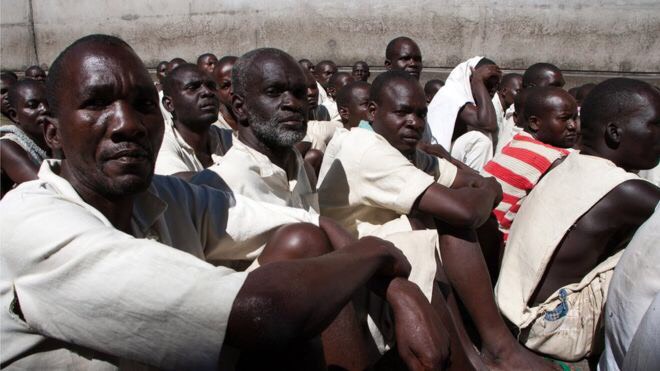- About
- Topics
- Picks
- Audio
- Story
- In-Depth
- Opinion
- News
- Donate
- Signup for our newsletterOur Editors' Best Picks.Send
Read, Debate: Engage.
| December 15, 2020 | |
|---|---|
| topic: | Death Penalty |
| tags: | #death penalty, #abolitionist, #human rights |
| located: | Zambia |
| by: | Cyril Zenda |
Although the southern African nation is a de facto abolitionist, having not carried out any executions since 1997, some 23 years ago, the death penalty is not just in Zambia’s statute books, but in the hearts of citizens too. This is the dilemma that President Edgar Lungu, an abolitionist, faces.
In Zambia, the death sentence is mandatory for the crimes of treason, murder and aggravated robbery.
Packed Death Row
When President Lungu came into office in January 2015, one of his first tasks was to commute the death sentences of all 332 death row prisoners to life imprisonment. Since then, the fresh death row figures have snowballed to more than 400. While most of those that President Lungu removed from the death row were mostly those prisoners that had benefited from his three predecessors’ not sending people to their death, it is the rate at which the new death row has been growing that has become a cause for serious concern.
While President Lungu has tried to help change attitudes towards the death penalty, he has not been successful because as recent as 2016, some Zambians were still opposed to any attempts to remove capital punishment from the statute books, leaving him stranded.
‘Hell On Earth’
According to recent media reports, all the over 400 death row prisoners are housed in the ‘Condemn Section’ of Mukobeko Maximum Security Prison in the central city of Kabwe. This section of the prison has a design capacity for only 48 inmates but now has to carry nearly ten times its capacity, a situation that forces inmates to take turns to sleep. It is a sad situation that former Vice President Dr. Guy Scott, described as “hell on earth’ after he toured the facility a few years ago.
While over-crowding is by far worse in the “Condemn Section” of Mukobeko prison, the situation is also far from good in the rest of prisons because while Zambia’s 90 jails were designed to carry a maximum of 8,000 inmates, they are currently home to more than 22,000 prisoners.
Pleas For Relief
This over-crowding is the reason prison authorities are continuously pleading for more pardons to decongest the death row section at Mukobeko prison.
“The men in Condemn Section need pardons so that we can reduce on the numbers,” said Dr. Chisela Chileshe, the Commissioner General of the Zambia Correctional Service in an interview with the local media. “We really have challenges with space and we are appealing to the powers-that-be to consider even commuting their sentences to life so that we can reduce on the numbers.”
Earlier in the year, the country’s National Guidance and Religious Affairs minister Godfridah Sumaili, visited the ‘Condemn Section’ and saw for herself how congested the place is. “I have seen for myself the challenges you have. I will report to my superior so that we can see how we can help you,” said Sumaili.
At the end of October, when President Lungu set free about 1,000 in a presidential amnesty to mark the county’s 56th Independence, nine death row inmates had their sentences commuted to life, but this act of clemency – the second one this year – does not change much for the situation of death row prisoners.
Hope Only in Abolition
Although there have been no executions in more than two decades, human rights groups see abolition being the only solution to Zambia’s ever-growing death row population.
Mweelwa Muleya, the spokesperson for the Human Rights Commission (HRC) said the government should be encouraged to ensure that the country successfully graduates into the growing number of countries that have abolished the death penalty both in law and in practice.
“To this end, the commission is calling for members of the public and various stakeholders to make submissions to the Zambia Law Development Commission to appropriately amend the penal code and the criminal procedure acts in order to enhance respect for the right to life,” he said in a statement.
In its turn, the government says while it has always been ready for abolition, there is need for rights groups to help it in changing the attitudes of citizens regarding capital punishment.
The Vice President, Inonge Wina, urged human rights groups to take advantage of the prevailing political and public goodwill to scale up public sensitisation on the need to abolish the death penalty.
By copying the embed code below, you agree to adhere to our republishing guidelines.
